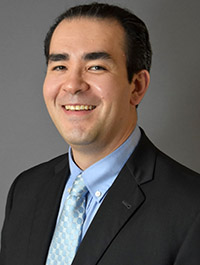
Department of Neurosurgery
Welcome to the Department of Neurosurgery at Tulane University, and thank you for your interest. We hope that you find our website to be informative.
Our talented and diverse faculty members provide the highest quality of patient care with expertise in every subspecialty area of neurosurgery. We incorporate a multidisciplinary team approach, an unwavering commitment to the pursuit of excellence, personalized attention, innovation, and cutting edge technology and techniques to provide the best possible outcome for every patient that entrusts us with their neurosurgical care. We have specific expertise and vast experience in stroke and cerebrovascular disease (for example, aneurysms, vascular malformations, ischemic stroke, carotid artery disease, moyamoya disease), neuro-oncology (brain and spine tumors), spine disease, movement disorders/epilepsy (stereotactic and functional neurosurgery), pain syndromes, pediatric disorders and peripheral nerve disorders (brachial plexus, nerve entrapments, and injuries).
Our clinical and translational research programs are outstanding. Primary research faculty have diverse interests in ischemic and hemorrhagic stroke, traumatic brain injury, surgical anatomy, vascular dementia, and neural regeneration. In addition, clinical faculty have complementary research interests in their areas of subspecialty expertise. Extramural funding has grown from the National Institutes of Health (9 active grants currently) as well through foundations and industry. Numerous clinical trials and translational research involving patients continue to grow. Faculty, residents, and postdoctoral fellows are actively engaging in scholarly activity, publishing books, and peer-reviewed journal articles as well as presenting findings at local, national, and international meetings. We have expanded our collaborations with other Departments in the School of Medicine, the School of Public Health and Tropical Medicine, the Tulane National Primate Center, and the School of Science and Engineering. Collectively, research efforts focus on improving care of the patients of tomorrow, and we are poised to continue to make impactful breakthroughs.
The residency training program, a joint program of Tulane University and Ochsner Clinic Foundation, was founded in 1944 as one of the original neurosurgical training programs in the United States. With 25 neurosurgeons working in combination with a team of Advanced Practice Providers, neurologists, orthopedic surgeons, oncologists, and others, residents are exposed to a rich, broad, and deep array of patients with neurosurgical disease. Annual surgical case volume exceeds 3,000 cases. Additionally, residents have tremendous opportunities for research, academic development, and enfolded CAST-accredited subspecialty fellowship training during their residency training.
Once again, thank you for your interest in the Department of Neurosurgery at Tulane University. Despite a changing healthcare landscape, an evolving pandemic, and other potential challenges, we believe that this is truly an exciting time for our program, as we continue to grow and evolve. Please do not hesitate to contact us if with any questions.
Aaron S. Dumont, MD, MBA, FACS, FAHA, FAANS
Associate Dean & Vice President of Health System Clinical Affairs
Charles B. Wilson Professor & Chair of Neurosurgery
We have a steadfast commitment to providing the highest quality of care for every patient that we assume the privilege to serve. We are proud to have expertise across all subspecialty areas including cerebrovascular and endovascular neurosurgery, spine surgery, neuro-oncologic surgery, stereotactic and functional neurosurgery, peripheral nerve surgery and pediatric neurosurgery. We are committed to innovation and offering our patients the latest and most exciting treatment options. We uniquely have two neurosurgeons dual-trained in both open microsurgery and minimally invasive endovascular neurosurgery for treatment of vascular disorders of the brain and spine. We have experience in treating more than 1000 patients with brain aneurysms with these techniques including use of the Pipeline embolization device (concerning which we proctor other surgeons across the country). Additionally, our physicians have been leaders in national and international clinical trials and research for brain aneurysms and stroke. We also have fellowship-trained neurosurgeons to offer the latest treatment options (including minimally invasive techniques) for other neurosurgical conditions including brain and spine tumors as well as all other conditions of the spine.
We have initiated a patient safety and quality improvement program to ensure that our care exceeds national standards, and most importantly, meets or exceeds the expectations of each of our patients. Part of our mission in clinical care also centers on improving the care of patients in our larger geographic community and we have committed to expanding our telemedicine network for citizens of Louisiana, Mississippi and beyond. Our physicians have repeatedly been recognized with honors such as inclusion in "Best Doctors in America", "America's Top Surgeons", and "Patient's Choice Awards" from consumer's health sites such as Health Grades.
Our Tulane-Ochsner Neurosurgery Residency Program is thriving and is placed of utmost importance in our strategic plan. We are absolutely committed to the training of our residents and are interested in training the future leaders of academic neurosurgery. We believe that we have a unique blend of talented faculty with expertise across all subspecialty areas, an individualized plan for each resident’s academic development leveraging our departmental and institutional strengths and resources, coupled with an innovative and thoughtful formal curriculum for resident education. I sincerely believe that this is an exciting time to be a resident in our program.
Our research program is expanding and we are focused upon clinical and translational research that will improve the care of our patients both now and in the future. Our research portfolio includes an NIH-funded program to investigate the role of inflammation and oxidative stress in brain aneurysm formation, progression and rupture with the ultimate goal of developing minimally invasive or non-invasive therapies to treat brain aneurysms and ameliorate the devastation inflicted by aneurysm rupture. We also have robust programs investigating endovascular technology and device development, diverse clinical trials in stroke and spinal disorders, and outcomes research in neurosurgical conditions.
Once again, thank you for your interest in the Department of Neurological Surgery at Tulane University. This is truly an exciting time in our Department. Please do not hesitate to contact me if I can assist you further in any way.
Aaron Dumont
